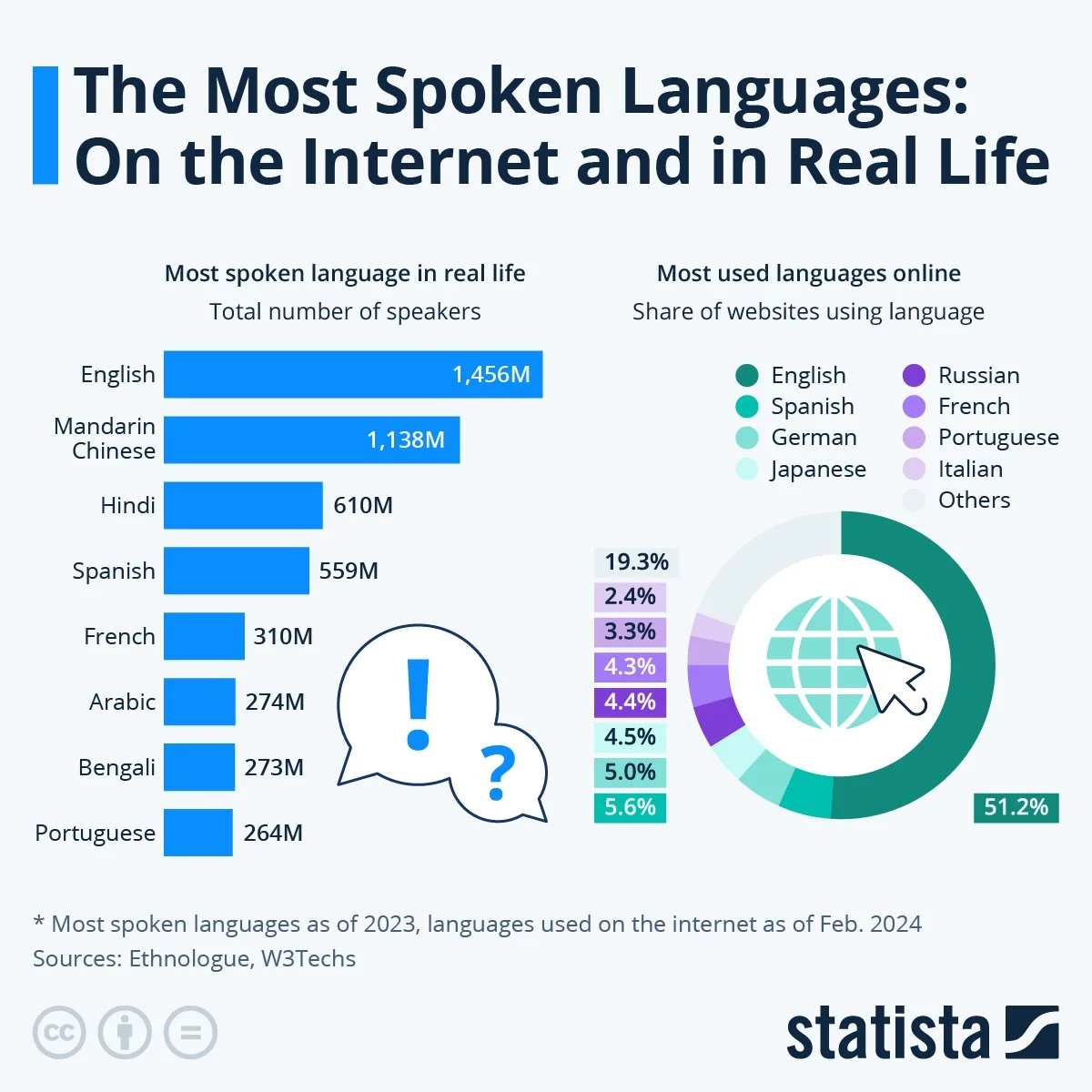Your Website Speaks English — But Do Your Customers?
Written by: Mishyali
Why Content Localisation Could Be The Game-Changer Your Business Needs
Let’s say you’ve built a beautiful website. It’s sleek, full of great content and written in clear, polished English. You’re proud of it - and rightly so.
But let’s take a step back and ask:
Your website speaks English - but do your customers?
If your business is reaching people in different countries or regions, chances are, many of them would much rather read your content in their own language. And not just a direct translation - we’re talking about localisation. It’s what makes the difference between “Hmm, interesting” and “Oh wow, this is exactly what I needed.”
Let’s get into what content localisation really is, why it matters and how it can seriously boost your business.
So, What Is Content Localisation?
Think of localisation as translation’s smarter, friendlier sibling.
It’s not just about swapping English words for French or Spanish ones. Localisation adapts your content so that it feels right to someone in a different country. It speaks their language - literally and culturally.
It includes things like:
Local expressions, slang, and tone of voice
Cultural references and humour that actually land
Dates, currencies, and units of measurement - all in familiar formats
Visuals, colours and even layout that resonate locally
In other words, localisation makes your website feel like it was built just for them. And that personal touch? It matters - a lot.
But Everyone Understands English… Right?
Not quite. English is widely used online - but most people browsing the internet aren’t native English speakers. In fact, over 80% of internet users speak other languages in real life.
According to CSA Research:
76% of consumers are more likely to buy products with information in their own language
40% won’t make a purchase if the info isn’t in their language
65% prefer content in their native tongue, even if the translation isn’t perfect
So while your English-only website might feel crystal clear to you, for potential customers in places like France, Japan or China, it could feel distant or confusing.
That’s a lot of potential sales slipping through the cracks.
Why Localisation Is So Good For SEO (And That’s A Big Deal)
Here’s where it gets exciting: localised content isn’t just better for users — it’s better for your rankings. Search engines are smart. They want to deliver results that are relevant to each user’s language, location and search habits.
If someone in Mexico searches in Spanish, Google will serve them Spanish-language content that matches what they’re looking for.
When you localise your website, you’re:
Using the right keywords for each market
Appearing in country-specific versions of Google (like Google.fr or Google.de)
Matching local search intent more closely
Encouraging users to stay longer and engage more
All of this tells search engines “This website is helpful to people in this region” - and that can mean better rankings, more clicks and more conversions.
In short, website localisation makes it easier for your ideal customers to find you and stick around.
Let’s Talk ROI: Is Content Localisation Worth It?
Absolutely. It might feel like a big task, especially if you're starting from scratch, but the returns can be huge. Here’s how localisation pays off:
More Sales
When people understand what you’re offering — and feel like it’s meant for them — they’re far more likely to buy.
Happier Customers
A localised site feels welcoming. It builds trust, shows respect and creates a more enjoyable experience.
Fewer Support Tickets
When your FAQs, help pages and instructions are clear and in your customer’s language, they can help themselves. That saves your team time and energy.
Better Marketing Performance
Localised ads, landing pages and product descriptions convert better because they speak directly to your audience.
Global Reach Without Reinventing The Wheel
You don’t have to change your entire business - just the way you communicate. Localisation lets you reach new markets while staying true to your brand.
Big Brands Are Already Doing This - And Doing It Well
Don’t just take our word for it - let’s look at a few familiar names:
Airbnb: They go beyond translation, tailoring listings, visuals and even the app interface for different cultures. It’s part of why they’re trusted in 200+ countries.
Spotify: Localised playlists, campaigns in regional slang and a strong focus on promoting local artists help them connect emotionally with listeners.
Netflix: They’ve nailed localisation. From subtitled shows to full-blown productions tailored to local audiences. That’s how a Korean thriller can go viral worldwide.
ASOS: From region-specific sizing guides to delivery options, they make it easy for international shoppers to buy with confidence.
McDonald’s: A classic example. Their menus adapt to local tastes and so do their marketing campaigns - ever heard of the McAloo Tikki or Bulgogi Burger?
Even in B2B companies that localise whitepapers, product documentation and service pages see stronger engagement, better leads and smoother international partnerships.
How To Localise Content (Without Losing Your Mind)
Localisation doesn’t have to be overwhelming. Here’s a simple starting point:
Identify Your Key Markets
Where do you already get traffic or sales from? Where do you want to grow?
Start Small
Focus on high-impact pages first, like your homepage, best-selling products, and checkout process.
Work With Native Speakers
Human translators understand nuance. They can help you sound natural, not robotic.
Adapt Beyond The Text
Update visuals, tone, and cultural references. Even small tweaks can go a long way.
Follow SEO Best Practices
Use local keywords, meta tags, and hreflang attributes so search engines know which version to show.
Measure And Adjust
Track what’s working, and keep refining your approach as you go.
Final Thoughts: Speak Their Language, Win Their Hearts
Content localisation isn’t just about language - it’s about connection.
It’s about showing your audience that you see them, that you understand them, and that you’ve taken the time to make them feel welcome. And that kind of message? It builds trust. It drives conversions. It opens doors to new markets.
So if your website currently only speaks English, it might be time to ask: is it truly speaking to everyone you want to reach?
Ready To Go Global?
At Content Quality UK, we help businesses like yours connect with international audiences in meaningful, culturally relevant ways. Since 2013, we’ve translated more than 14.8 million words across 30+ languages, from full websites and legal documents to social media campaigns and video subtitles.
With a dedicated Project Manager by your side and native-speaking experts on every job, we don’t just translate - we transform your content.
Let’s make your message truly multilingual.
Get a quote today and start building real connections around the world.
Because when your words work everywhere, your business can, too.


